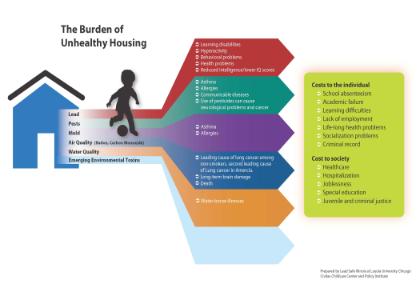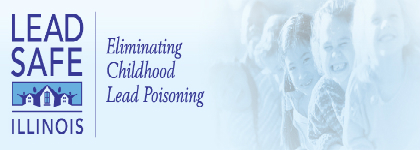History & Mission
Lead Safe Illinois
Lead Safe Illinois is convened by the Illinois Lead Safe Housing Task Force and the Loyola University Civitas ChildLaw Center's Policy Institute. The Illinois Lead Safe Housing Task Force, formed in 1997, is an alliance of individuals and public, private, and not-for-profit groups committed to ending childhood lead poisoning that advocates for policy reform, promotes public awareness, and fosters collaborations to achieve its mission. The Task Force is chaired and staffed by the Civitas ChildLaw Center's Policy Institute, a part of Loyola University Chicago School of Law. The Policy Institute promotes child-centered laws, policies and practices, and aims to improve the functioning of the legal, social welfare, juvenile justice, health care and other systems that impact children and families.
Lead Safe Illinois is a campaign to eliminate lead poisoning in Illinois by raising awareness and advocating for legislation and policy reform to prevent childhood lead poisoning. The campaign works with several lead-safe community initiatives throughout the state to eliminate childhood lead poisoning.
Healthy Homes/Healthy Communities Initiative

Beyond the scope of lead poisoning and it's costs to a child's health and future, it has long been recognized that various indoor toxic hazard pose the same burdens and risks to children and families. It is also true that scientists have long recognized that indoor toxic hazards typically pose far greater risks to children’s health than outdoor exposures because of the concentrated levels.
Health hazards encountered in the home include: dust, mold, and pests which can cause asthma; lead, pesticides, food additives, and other toxic materials which can result in learning disabilities, and behavioral and health problems; and dangerous gases such as carbon monoxide and radon which can result in long term brain damage, cancer, and death. The costs to the individual of these toxins can be school absenteeism, learning difficulties, academic failure, lack of employment, life-long health problems, socialization problems, criminal records. Societal costs include healthcare, hospitalization, joblessness, special education, and the juvenile and criminal justice systems.
Stemming from Lead Safe Illinois and in response to the risks that these toxins pose to children and families’ health, the Center for the Human Rights of Children, Center for Urban Environmental Research and Policy, Center for Urban Research and Learning, Loyola University Medical Center, and Loyola Law School’s Civitas ChildLaw Center (“The Centers”) at Loyola University Chicago developed the “Advancing Healthy Homes/Healthy Communities—Tackling Environmental Disparities (“Healthy Homes/Healthy Communities Initiative”) project.
Mission
The mission of the project is to develop Loyola University’s capacity as a leading educational institution with a commitment to building a holistic approach in creating healthy homes and healthy communities free of environmental and social toxins.



